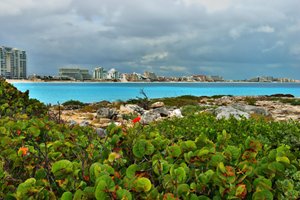
Mexico is a country rich in history, culture, and natural beauty. From ancient civilisations to vibrant traditions, here are 10 fascinating facts about Mexico that you might not know:
The Mesoamerican Reef System, stretching over 1,000 kilometres along Mexico's Caribbean coast, is the second-largest coral reef globally, following Australia's Great Barrier Reef. This vibrant ecosystem supports a diverse range of marine life and is a haven for divers and snorkelers.
While Spanish is the predominant language, Mexico officially recognises 68 national languages, including 63 indigenous ones. These languages reflect the country's rich indigenous heritage and cultural diversity.
Built on a drained lake, Mexico City is slowly sinking at an estimated rate of 12 centimetres per year. This phenomenon is due to the extraction of groundwater and the soft clay beneath the city.
La Catrina, the elegant skeletal figure associated with Mexico's Day of the Dead celebrations, was originally created by artist José Guadalupe Posada as a satirical portrayal of the Mexican upper class. Today, she symbolises the country's rich cultural heritage and the acceptance of death as part of life.
The National Autonomous University of Mexico (UNAM), founded in 1551, is the oldest university in North and Central America. It predates Harvard University by over eight decades and remains a leading institution in Latin America.
Mexico's flag features an eagle perched on a cactus with a snake in its beak. This image represents the Aztec legend of their gods instructing them to settle where they saw such a vision, leading to the founding of Tenochtitlán, now Mexico City.
Chocolate, as we know it today, was introduced to Europe by Mexico. The ancient civilisations of Mesoamerica, such as the Aztecs and Mayans, were the first to cultivate and consume cacao, using it in beverages and as currency.
The Great Pyramid of Cholula, located in Puebla, Mexico, is the largest pyramid in the world by volume, surpassing even Egypt's Great Pyramid of Giza. This ancient structure was built by the pre-Hispanic civilisations of Mesoamerica.
Lucha libre, Mexico's unique form of professional wrestling, is a beloved sport featuring colourful masks and dramatic storylines. Matches are held in arenas across the country, drawing enthusiastic crowds and showcasing a blend of athleticism and theatrical performance.
The axolotl, a unique salamander known for its regenerative abilities, is native to Mexico. Endemic to the lakes of Xochimilco near Mexico City, it has become a symbol of national pride and is featured on the 50-peso bill.
Mexico's rich tapestry of history, culture, and natural wonders makes it a captivating destination for travellers and a source of pride for its people. Whether you're exploring ancient ruins, savouring authentic cuisine, or participating in vibrant festivals, Mexico offers a wealth of experiences waiting to be discovered